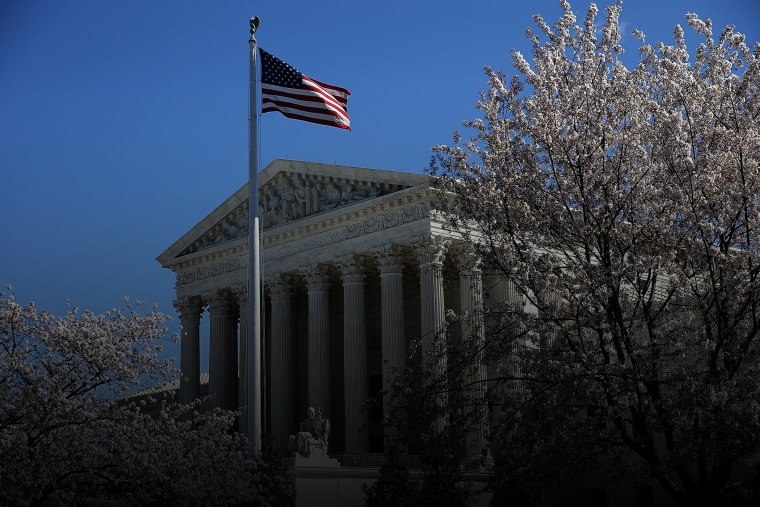The U.S. Supreme Court appeared divided Monday on an issue hotly contested in the presidential campaign — a potential blow for the White House in the battle over President Obama's immigration policy that could shield more than four million people from deportation.
As justices peppered a lawyer for the Obama administration, it became clear that the court was split. The prospect of a 4-4 tie would mean a loss for the administration because it would leave a lower court order in place.
Lower courts have blocked its implementation since the president announced it a year and a half ago. A win would allow him to begin enforcing the measure before leaving office.
Adults in the United States illegally could remain if they meet certain residency requirements and have children who are American citizens or lawful permanent residents. It would also expand another program, now in effect, that allows young people to stay in the country if they were brought to the U.S. under age 16.
Led by Texas, 26 states claim the president had no power to order the changes, and they have so far prevailed. Supreme Court Justice Antonin Scalia's death has deprived them of one likely high court ally. But if the case ends in a 4-4 tie, the legal hold on the program would remain in place — a defeat for the administration.
With 11 million undocumented migrants living in the U.S., the administration argues it's impossible to deport everyone who's here illegally. The policy is based on setting priorities — concentrating on criminals and terrorists and deferring removal for others who have established ties to the U.S.
"You can come out of the shadows and get right with the law. That's what this deal is," President Obama said in unveiling the plan.
His policy would not offer permanent legal status, but it would defer for three years any effort to seek deportation for those qualified. The government argues that there's nothing new about such a move, citing similar accommodations given to undocumented Cubans after the Castro revolution, undocumented spouses and children of legal immigrants two decades ago, and foreign students affected by Hurricane Katrina.
And because those allowed to remain need some way to make ends meet, they would be eligible to seek work permits. "Work authorization has long been tied to the exercise of this kind of discretion," says the Justice Department.
Some of the court's conservatives may be receptive to the administration's argument. In a 2012 case, Justice Anthony Kennedy said federal immigration officials have broad discretion in deciding who should be deported and who should be allowed to stay.
"Discretion in the enforcement of immigration law embraces immediate human concerns. Unauthorized workers trying to support their families, for example, likely pose less danger than alien smugglers or aliens who commit a serious crime," he wrote.
The government also urges the court to rule that the states have no legal standing to sue over the policy, because immigration has long been the province of the federal government and because the states aren't required or forbidden to do anything under the program.
RELATED: Detaining immigrant kids hasn't worked -- US wants to try something new
The states say Congress has never given presidents a blank check for granting lawful status to people here illegally. They argue that the policy does far more than simply abandon removal proceedings, by converting illegal presence into lawful status — something they say only Congress can do — and granting permission to seek work permits.
Texas argues that it would be saddled with the cost of issuing driver's licenses to at least half a million parents who would be eligible to stay, at a cost of millions of dollars. And all the states would face "substantial education, healthcare, and law enforcement costs."
The Justice Department responds that the driver's license issue is a burden Texas brought upon itself by choosing to heavily subsidize the cost of issuing them.
And the states claim that the new rules are such a change in policy that the government should have sought public comment before announcing them.
In agreeing to take up the case, the Supreme Court also ordered both sides to address whether issuing the policy violated the Constitution's command that a president "shall take care that all laws be faithfully executed," an issue the states raised in the lower courts.
Sixteen other states are urging the justice to let the policy take effect. It would allow "millions of hard-working immigrants to work legally, dramatically increasing their incomes and state tax revenues," says Bob Ferguson, Washington's attorney general.
And it would allow families to remain intact, instead of deporting the parents and leaving the children in the child welfare system at great expense to states.
A decision is expected by late June.
Halimah Abdullah contributed. This article originally appeared on NBCNews.com.
